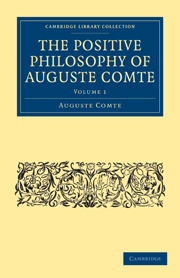CHAPTER VI - ELECTROLOGY
Published online by Cambridge University Press: 29 August 2010
Summary
History
This last branch of Physics, relating as it does to the most complex and least manifest phenomena, could not be developed till after the rest. The electrical machine indeed is as old as the air-pump ; but it was not till a century later that the study assumed a scientific character, through the distinction of the two electricities, Muschenbroek's experiments with the Leyden jar, and then through Franklin's great meteorological discovery, which was the first manifestation of the influence of electricity in the general system of nature. Up to that time, the isolated observations of philosophers had only suggested the character of generality inherent in this part of Physics, as in all others, by continually adding to the number of substances susceptible of electrical phenomena : and it was not till the end of the last century that this department of Physics presented anything like the rational character which belongs to the others. It is owing to the labours of Coulomb that it takes its place, and still an inferior place, with the rest.
Condition
No other science offers so great a variety of curious and important phenomena; but facts do not constitute science, though they are its foundation and material. Science consists in the systematizing of facts under established general laws : and, regarded in this way, Electrology is the least advanced of all the branches of Physics, imperfect as they all are.
- Type
- Chapter
- Information
- The Positive Philosophy of Auguste Comte , pp. 278 - 288Publisher: Cambridge University PressPrint publication year: 2009First published in: 1853

